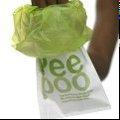This is the VOA Special English Development Report.
The name sounds funny but the idea is no joke: a personal toilet called the Peepoo. Anders Wilhelmson is the Swedish inventor of the idea. He wants to give poor people in developing countries a simple way to improve their lives.
The toilet is a single-use bag made of environmentally friendly plastics. The inside is treated with urea, a chemical commonly used as fertilizer. A natural reaction kills harmful organisms in the waste. It reduces the waste to fertilizer that Anders Wilhelmson says is safe for growing food.
Anders Wilhelmson: "When the feces is sanitized, all the pathogens are inactivated and killed, it is a valuable fertilizer. It's full of [nutrients] that we need so, you can just bury it in a pot and grow whatever you like." The hotter the weather, the more quickly the waste breaks down into ammonia to be taken up by plants. Anders Wilhelmson says the sanitation process can take as little as a couple of hours or as long as two to four weeks.
He is an architect and a professor at Sweden's Royal Institute of Technology. He became interested in the idea of sanitation after taking part in a research project on the social and political development of cities. One of the most common complaints he heard in developing countries was the lack of toilets.
He worked with others to design the invention. He launched the project in two thousand five, and the next year started a company called Peepoople.
The company is beginning production in Nairobi. It expects to start selling the bags in August in Kenya and Bangladesh. Full production could reach about half a million bags a day.
Peepoople plans to sell the bags for two to three cents each. Anders Wilhelmson says people can get back ten times what they paid by using the resulting fertilizer to grow vegetable gardens.
The United Nations says more than two and a half billion people around the world do not have good sanitation. Many have no choice but to use the outdoors. Poor sanitation leads to infectious diseases that kill more than one and a half million people a year, mostly young children.
Jack Sim is the founder of the World Toilet Organization, a nonprofit group working to improve conditions.
Jack Sim: "This is quite an unacceptable situation given the fact that we are all living in [the] modern world. And strangely, many of them [own] radio, television, hand phone and no toilet." He says the "sanitation marketplace" and inventions like this one are the best way to help people meet a most basic need. And that's the VOA Special English Development Report, written by June Simms. You can find transcripts and MP3s of our programs at voaspecialenglish.com. I'm Steve Ember.

